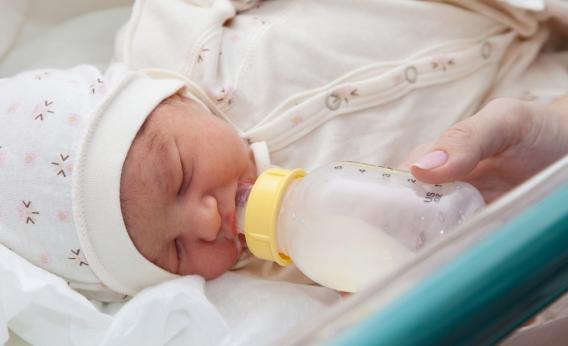This is goodbye! I hope you enjoyed the blog, and if you have more questions, check out the whole book, which covers many more topics: epidurals, home births, weight gain, and hot yoga, among others.
My book stops at the delivery room, but as many people have pointed out to me in emails, the decisions definitely do not. As we part, I just wanted to share with you the first big one I faced not as a pregnant woman but as a new mom. My daughter was born at 7 pounds 12 ounces, and since she arrived first thing in the morning, we got two nights in the hospital. On the second night they took her away for some kind of test and came back to inform me that she had lost 11 percent of her body weight. Since the hospital’s limit was 10 percent, I would have to start giving her formula or—and this is a direct quote—“She might not be able to go home with you.”
The data-driven part of me thought, “Wait a minute. Aren’t 11 percent and 10 percent basically the same?” The hormone-crazed postpartum mom part thought, “I will do anything under the sun to take my baby home.” And so I found myself taping together some kind of elaborate tubing system so Penelope would think she was nursing but really be getting formula.
I remember thinking to myself, “I really should research this weight-loss issue.” But then they did let me take her home, and I completely forgot about the issue until months later a friend told me that she experienced the same thing. It seems to be a pretty common situation—another friend was told to save all the diapers her kid produced to weigh them. So what’s the deal?
The big concern with excess weight loss is it could reflect dehydration (if the baby isn’t getting enough milk), and this can have very bad consequences, like a stroke. This is quite rare but has been observed in case studies. The babies in these studies have lost a lot of weight—say, 20 percent by eight days after birth—but the broad concerns are the same even if your baby hasn’t lost as much.
In terms of what is normal: Based on one study, the average breast-fed baby will lose about 7 percent of his or her body weight in the first three days. Five percent of babies will lose 12 percent or more. Formula-fed babies lose much less. By drawing the line at 10 percent for encouraging supplementation, as many hospitals do, about 10 percent of breast-fed babies will fall below the cutoff (and less than 2 percent of formula-fed babies).
Of course, an equally important issue—and one I also had not researched—was whether giving some formula early on would impact my ability to successfully breast-feed later. In fact, it seems like the answer is no—this based on one recent randomized trial, and one older one.
So had I known all of this at 3 a.m. on the day after delivery, what would I have done? I still would have gone ahead with the formula. While 10 percent (or 11 in my child’s case) weight loss isn’t a real reason to panic, in principle there are serious consequences, and 10 percent is on the high end. And there is really no downside to a small amount of formula at this point. I also would have paid much more attention to how much my daughter was peeing—since dehydration will show up in reduced urine output, that is an important sign alongside weight loss that something should be done.
Fortunately, by the time we got home, my husband had already set up a computer in the baby’s room to record all wet and dirty diapers, nursing time, milk intake, and sleep schedules. The real data-driven decisions were just beginning.
